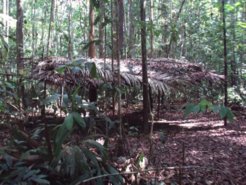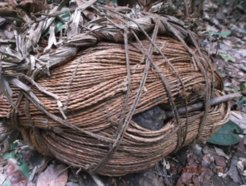New Special Issue Discusses Isolated Indigenous Groups in the Amazon
A new thematic special issue of the Brazilian Journal for Anthropological Linguistics (Revista Brasileira de Linguística Antropológica) focuses on isolated and recently contacted Tupi-speaking Indigenous groups from the Amazon forest, highlighting the potential of archaeology to provide new insights into the history and adaptation of these populations. Laura Furquim, member of the isoTROPIC Group, is part of the multidisciplinary team that organized the publication.

In Brazil, the National Foundation of Indigenous Peoples (FUNAI) has confirmed 28 reports of Indigenous groups that have chosen to remain without contact with non-Indigenous peoples and is currently investigating another 120 reports. Meanwhile, 19 groups are considered “recently contacted,” with their rights to territory and to isolation guaranteed. These ‘isolated groups’ are monitored by FUNAI using satellite images of the canopy and by visiting abandoned camps or villages, with contact being deliberately avoided. This approach has lead to a growing focus on archaeological exploration of now uninhabited sites.
Using satellite images, researchers identify openings in the forest that can be related to gardening or camps. Meanwhile, underneath the canopy, a collaborative combination of traditional knowledge and interdisciplinary research can identify ceramic vessels, plant and animal food remains, mortar and pestles, houses and shelters, orchards and gardens, torches, and old metal tools obtained from nearby villages or farms.
Archaeological exploration of these remains is considered an increasingly critical part of understanding the long-term Indigenous history of the Amazon, which can support traditional knowledge and land policies. In addition, multidisciplinary archaeological approaches enable study of the ways in which past societies have shaped forests, leaving legacies for contemporary ecosystems, and the ways in which contemporary ‘isolated groups’ were part of vast Indigenous networks prior to disruption by European colonialism.

The new special issue of Revista Brasileira de Linguística Antropológica collects papers related to historical ecology, archaeology, linguistics and ethnology and presents a variety of key themes. It includes discussion about the concept of isolation and its historical context, the relationship between contacted and isolated groups over time, Indigenous uses of forest resources, interviews about experiences of ‘isolation’ and a special narrative about the life and death of the “Tanaru man” (who lived alone in isolation for decades after his entire group was murdered by local farmers). The main goal of the issue is to act as a reference for policy decision makers, scientists and social organisations focused on the changing social context of isolated and recently contacted Indigenous groups.
Many of the papers in the special issue mention the importance of Brazil nut orchards for Tupi-speaking groups, in terms of their culinary significance in recipes, their management as part of agroforestry strategies and their role as places of memorial.
Laura Furquim, visiting scholar within the isoTROPIC group at MPI-GEA, focuses on her work at archaeological sites and the analysis of past Indigenous foodways and land management. She is currently analysing ancient breads from archaeological contexts in the Amazon and comparing them to modern ones found in abandoned camps in order to understand the origins of this approach to food preservation and preserve Indigenous cultural food heritage in the region.

